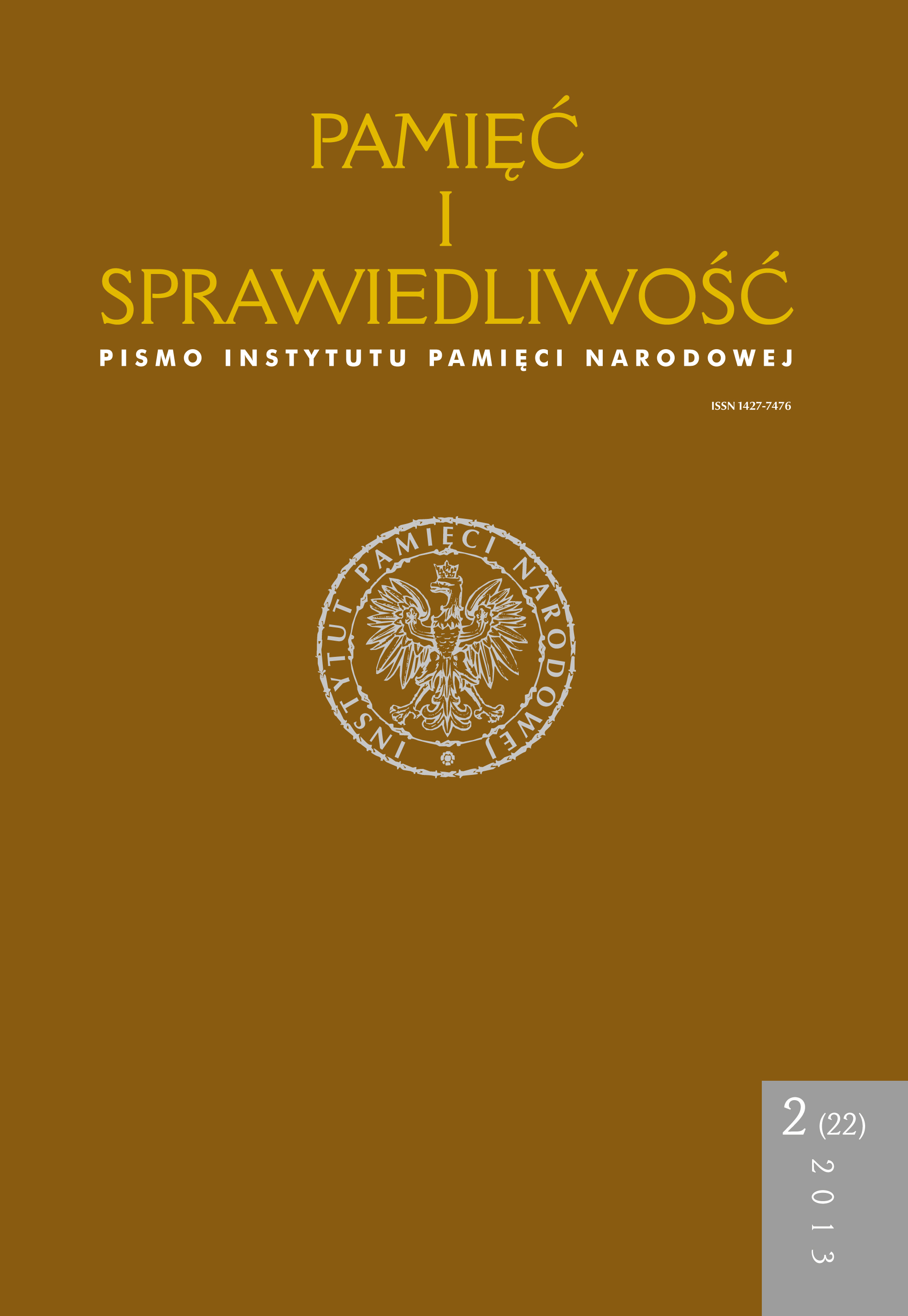Wyobraźnia (historyczna) i jej rola w procesie badania przeszłości
Pamięć i Sprawiedliwość, Tom 22 Nr 2 (2013), strony: 41-53
Data publikacji: 2013-12-30
Abstrakt
Bibliografia
- Krzysztof Pomian, Historia. Nauka wobec pamięci, Lublin 2006. - Marek Woźniak, Przeszłość jako przedmiot konstrukcji, Lublin 2010. - W. von Humboldt, O zadaniu historiografa [w:] Opowiadanie historii, red. J. Kałążny, Poznań 2003. - S. Smolka, Słowo o historii [w:] Historycy o historii, t. 1: 1775–1918, red. M. Serejski, Warszawa 1963. - S. Zakrzewski, Kultura historyczna [w:] Historycy o historii, t. 1: 1775–1918, red. M. Serejski, Warszawa 1963. - L. Finkel, Pojęcie, zakres i zadania dziejów powszechnych [w:] Historycy o historii, t. 2: 1918–1939, red. M. Serejski, Warszawa 1966. - A. Schinkel, Imagination as a category of history: an essay concerning koselleck’s concepts of erfahrungsraum and erwartungshorizont, „History and Theory” 2005, nr 44. - N.J. Thomas, Imagery and the Coherence of Imagination, „The Journal of Philosophical Research” 1997, nr 22. - N.J. Thomas, Theories of Imagination? An Active Perception Approach to Conscious Mental Content, „Cognitive Science” 1999, nr 23. - P.L. Harris, The Work of Imagination, Blackwell 2000. - P. Harpur, The Philosophers’ Secret Fire. A history of the imagination, London 2002. - P. Veyne, Did the Greeks believe in their myths? An essey on the constitutive imagination, Chicago 1988. - L. Stevenson, Twelve conceptions of imagination, „British Journal of Aesthetics” 2003, t. 43, nr 3. - M. Hughes-Warrington, How Good an Historian Shall I Be? R.G. Collingwood, the Historical Imagination and Education, Imprint Academic, British Idealist Studies Series 2 (Colingwood) Volume2, Exeter 2004. - P. Ricoeur, Imagination in Discourse and in Action [w:] Rethinking imagination. Culture and creativity, red. G. Robinson, J. Rundell, London 1994. - H. Cooper, History in the Early Years, New York 1995. - J. Trąbka, Wyobraźnia, Kraków 2001, . - A.R. Hart, Imagination in History [w:] „American Historical Review”, 1910, nr 15. - M.A. Henry, Problemized narratives: history as fiction in E. L. Doctorow’s „Billy Bathgate” (Comparative Metafiction), „Critique. Studies in Contemporary Fiction” 1997, vol. 39, nr 1. - D.H. Sacks, Imagination in history. (Practicing New Historicism & Hamlet in Purgatory), „Shakespeare Studies” 2003, nr 31. - H.S. Hughes, History as Art and as Science: Twin Vistas on the Past, New York 1964. - J.L. Gaddis, The Landscape of History: How Historians Map the past, Oxford–New York 2002. - R. Smith, Reflection on the historical imagination, „History of the Human Sciences” 2000, t. 13, nr 4. - H. Ritter, Dictionary of Concepts in History, London 1986. - J. Chiari, Realism and imagination, London 1960. - P. Veyne, Did the Greeks believe in their myths? An essey on the constitutive imagination, Chicago 1988. - M. Fulbrook, Historical Theory: Ways of Imagining the Past, London–New York 2002. - B.C. McCullagh, The Logic of History: Putting Postmodernism in Perspective, New York 2004. - M.C. Lemon, Philosophy of history: a guide for students, London–New York 2003. - D.W. Blight, Beyond the Battlefield: Race, Memory, and the American Civil War, Amherst (University of Massachusetts) 2002. - B. Taylor, Introduction: How Far, How Near: Distance and Proximity in the Historical Imagination, „History Workshop Journal” 2004, vol. 57, nr 1. - T.B. Macaulay, History, „Edinburgh Review, or Critical Journal”, 47 (1828). - H. Ritter, Dictionary of Concepts in History, London 1986. - R. Collingwood, The Idea of History, Oxford 1946. - H. White, Poetyka pisarstwa historycznego, Kraków 2002. - W.M. Nowak, Robina G. Collingwooda filozofia historii, Lublin 2002. - H. White, The Content of the Form. Narrative Discourse and Historicaal Representation, Baltimore 1987. - J. Topolski, Metodologia historii, Warszawa 1984. - J. Topolski, The role of logic and aesthetics in constructing narrative wholes in historiography, „History & Theory” 1999, t. 38, nr 2. - R. Tseng, The Sceptical Idealist: Michael Oakeshott as a Critic of the Enlightenment, Exeter 2003. - M. Johnson, Image Schemata Definitions [w:] The Body in the Mind. The bodily Basis of Meaning, Imagination and Reason, Chicago 1987. - J. Pomorski, Historiografia jako refleksja kultury poznającej [w:] Świat historii, red. W. Wrzosek, Poznań 1998. - K. Pomian, Historia. Nauka wobec pamięci, Lublin 2006. - J. Abromeit, M. Cobb, Herbert Marcuse: A Critical Reader, Routledge 2004. - R.F. Storch, The Politics of the imagination, „Studies in Romanticism” 1982, t. 21, nr 3. - K.H.R. Anderson, Imagination and ideology: Ethical tensions in twentieth-century French writing, „The Modern Language Review” 2001, t. 96, nr 1.
 Język Polski
Język Polski
 English
English
 Deutsch
Deutsch
 Français (France)
Français (France)
 Italiano
Italiano
 Русский
Русский


 PDF
PDF
